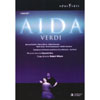Verdi Aida
Oh, Noh – a great Verdi work is brought to a standstill
View record and artist detailsRecord and Artist Details
Composer or Director: Giuseppe Verdi
Genre:
Opera
Label: Opus Arte
Magazine Review Date: 11/2006
Media Format: Digital Versatile Disc
Media Runtime: 159
Mastering:
Stereo
Catalogue Number: OA0954D

Tracks:
| Composition | Artist Credit |
|---|---|
| Aida |
Giuseppe Verdi, Composer
André Gregoire, Messenger, Tenor Chorus of La Monnaie Giuseppe Verdi, Composer Guido Jentjens, King, Bass Ildikó Komlósi, Amneris, Mezzo soprano Kazushi Ono, Conductor Marco Berti, Radames, Tenor Mark S. Doss, Amonasro, Baritone Michela Remor, Priestess, Soprano Norma Fantini, Aida, Soprano Orlin Anastassov, Ramfis, Bass Symphony Orchestra of La Monnaie |
Author: Alan Blyth
This cult production by Robert Wilson originated at La Monnaie when Pappano was music director there. He brought it to Covent Garden in November 2003 when it wasn’t very well received. This recording was made at the 2004 revival at La Monnaie under Kazushi Ono, Pappano’s successor.
As ever with Wilson’s work, we are in a world and style influenced by Noh theatre and silent films with a kind of distanced, glacial, intermittently effective lighting plot. The effect is hieratical in the extreme and initially has a strange fascination, its simplicity of setting and acting having for a while quite a hypnotic effect. But as the work progresses, one realises one is seeing Aida as some kind of staged oratorio, with the principals never touching, and emoting, if at all, only to themselves. In the grand scenes in the first two acts, most of the action is pretty static and the choreography is frankly ugly and amateurish.
The cast is middling. Norma Fantini is a competent Aida, with little subtlety or dynamic variety in her singing. She is dressed as some kind of “belle of the ball”, with no hint of the slave-girl about her. Ildikó Komlósi is a strong but not individual performer. She comes into her own in her big scene at the start of Act 4. Marco Berti is a true Italian Radames – something of a rarity today – and sings with some feeling for Verdian style. Mark Doss is perhaps the most dramatic, involving performer. His Amonasro is an imposing figure with a powerful voice. He fully conveys the Ethiopian leader’s implacable personality. Of the two basses the Ramfis looks ridiculously young to have reached such an authoritative position in Egyptian society; he sings firmly, as does as the King.
Ono conducts with sensitive feeling for Verdian line and dramatic verve. The orchestra acquits itself admirably. Unaccountably, the sound lacks focus: you need a high volume setting to get the best from it. For choice I would go for the magnificent 2003 Barcelona performance (Opus Arte, A/04), in the lavish decor painted by Josep Mestres Cabanes, 1936-45. It is a special experience with a superior cast.
As ever with Wilson’s work, we are in a world and style influenced by Noh theatre and silent films with a kind of distanced, glacial, intermittently effective lighting plot. The effect is hieratical in the extreme and initially has a strange fascination, its simplicity of setting and acting having for a while quite a hypnotic effect. But as the work progresses, one realises one is seeing Aida as some kind of staged oratorio, with the principals never touching, and emoting, if at all, only to themselves. In the grand scenes in the first two acts, most of the action is pretty static and the choreography is frankly ugly and amateurish.
The cast is middling. Norma Fantini is a competent Aida, with little subtlety or dynamic variety in her singing. She is dressed as some kind of “belle of the ball”, with no hint of the slave-girl about her. Ildikó Komlósi is a strong but not individual performer. She comes into her own in her big scene at the start of Act 4. Marco Berti is a true Italian Radames – something of a rarity today – and sings with some feeling for Verdian style. Mark Doss is perhaps the most dramatic, involving performer. His Amonasro is an imposing figure with a powerful voice. He fully conveys the Ethiopian leader’s implacable personality. Of the two basses the Ramfis looks ridiculously young to have reached such an authoritative position in Egyptian society; he sings firmly, as does as the King.
Ono conducts with sensitive feeling for Verdian line and dramatic verve. The orchestra acquits itself admirably. Unaccountably, the sound lacks focus: you need a high volume setting to get the best from it. For choice I would go for the magnificent 2003 Barcelona performance (Opus Arte, A/04), in the lavish decor painted by Josep Mestres Cabanes, 1936-45. It is a special experience with a superior cast.
Discover the world's largest classical music catalogue with Presto Music.

Gramophone Digital Club
- Digital Edition
- Digital Archive
- Reviews Database
- Full website access
From £8.75 / month
Subscribe
Gramophone Full Club
- Print Edition
- Digital Edition
- Digital Archive
- Reviews Database
- Full website access
From £11.00 / month
Subscribe
If you are a library, university or other organisation that would be interested in an institutional subscription to Gramophone please click here for further information.




